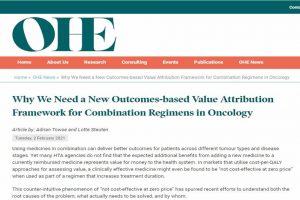Using medicines in combination can deliver better outcomes for patients across different tumour types and disease stages. Yet many HTA agencies do not find that the expected additional benefits from adding a new medicine to a currently reimbursed medicine represents value for money to the health system. In markets that utilise cost-per-QALY approaches for assessing value, a clinically effective medicine might even be found to be “not cost-effective at zero price” when used as part of a regimen that increases treatment duration.
This counter-intuitive phenomenon of “not cost-effective at zero price” has spurred recent efforts to understand both the root causes of the problem, what actually needs to be solved, and by whom.
A new publication by authors from OHE (Adrian Towse and Lotte Steuten) and Amgen (Mickael Lothgren and Andrew Bruce) contributes to the emerging debate as to why a new approach is required to address the value attribution problem in combination treatments. It sets out two key concepts required for an understanding of the relative performance of a combination regimen as compared to a monotherapy, considering (i) additive scale (how much additional value is generated when compared with their independent use as monotherapies) and (ii) the relative change in treatment duration as compared to the relative increase in overall survival.

